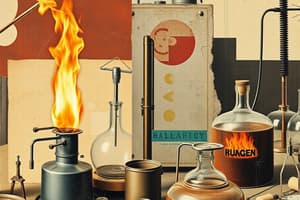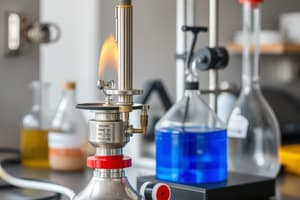Podcast
Questions and Answers
What should you check before using a Bunsen burner?
What should you check before using a Bunsen burner?
Make sure all equipment is clean and in good working order, and that all materials needed are available.
What is the purpose of a fire blanket?
What is the purpose of a fire blanket?
A fire blanket is used to suffocate flames by removing the oxygen supply.
You should wear safety goggles and remove jewelry when using a Bunsen burner.
You should wear safety goggles and remove jewelry when using a Bunsen burner.
True (A)
What should you do if you find cracks in the gas supply line?
What should you do if you find cracks in the gas supply line?
How should the supply hose be connected to the Bunsen burner?
How should the supply hose be connected to the Bunsen burner?
You can handle the Bunsen burner by any part once it is lit.
You can handle the Bunsen burner by any part once it is lit.
What are the main parts of a Bunsen burner?
What are the main parts of a Bunsen burner?
Where is the hottest part of the flame located?
Where is the hottest part of the flame located?
The lowest oxygen required for combustion is supplied at the top of the barrel from the surrounding air when the collar is turned to a position that ___ air ports.
The lowest oxygen required for combustion is supplied at the top of the barrel from the surrounding air when the collar is turned to a position that ___ air ports.
Match the following Bunsen burner parts with their functions:
Match the following Bunsen burner parts with their functions:
What is the definition of 'base' in relation to a Bunsen burner?
What is the definition of 'base' in relation to a Bunsen burner?
What is the function of the 'collar' on a Bunsen burner?
What is the function of the 'collar' on a Bunsen burner?
What is the 'barrel' in context of a Bunsen burner?
What is the 'barrel' in context of a Bunsen burner?
What does 'hot part' refer to in terms of a Bunsen burner?
What does 'hot part' refer to in terms of a Bunsen burner?
Define 'cooler part' in relation to a Bunsen burner.
Define 'cooler part' in relation to a Bunsen burner.
What is the definition of an 'air hole' in a Bunsen burner?
What is the definition of an 'air hole' in a Bunsen burner?
What is the 'gas hose' in a Bunsen burner setup?
What is the 'gas hose' in a Bunsen burner setup?
What does 'metal base' refer to in the context of a Bunsen burner?
What does 'metal base' refer to in the context of a Bunsen burner?
Flashcards are hidden until you start studying
Study Notes
Safety Precautions
- Ensure all laboratory equipment is clean and operational before use.
- Familiarize yourself with the location and operation of safety equipment, such as fire blankets and extinguishers.
- Dress appropriately by wearing safety goggles, securing long hair, tucking in loose clothing, and removing risky accessories like jewelry.
Bunsen Burner Setup
- Inspect gas supply lines for cracks; replace tubing if any visible damage is found.
- Securely connect the supply hose to the gas main and Bunsen burner, ensuring no gas escapes except through the burner.
- Always handle the burner by the base or collar to avoid burns from hot surfaces after ignition.
Bunsen Burner Components
- The base provides stability and prevents tipping; the upright section is the barrel.
- The collar, located at the base of the barrel, can be rotated to adjust the air ports for controlling air intake during combustion.
- The needle valve controls gas flow into the barrel, crucial for mixing with air to generate the flame.
Flame Characteristics
- The hottest part of the flame is located at the tip of the inner flame.
- Air and gas mix in the barrel; maintaining air ports open yields a hotter, safer flame.
- Closing the air ports produces a cooler yellow flame, referred to as the safety flame, which is less hazardous when not in use.
Flame Control
- The mixture ratio of gas to air affects the heat produced; equimolar amounts result in the hottest flame.
- Adjusting both the needle valve and collar provides control over flame height and temperature; small openings yield a smaller hot flame while larger openings create a taller one.
Key Parts of the Bunsen Burner
- Base: The part that rests on the work surface, ensuring stability.
- Collar: Adjustable component for regulating air flow through air ports.
- Barrel: The upright portion where gas and air mix for combustion.
- Air hole: Allows air into the barrel for mixing with gas.
- Gas hose: Connects the burner to the gas supply for fuel delivery.
- Metal base: Enhances stability of the burner.
Studying That Suits You
Use AI to generate personalized quizzes and flashcards to suit your learning preferences.




